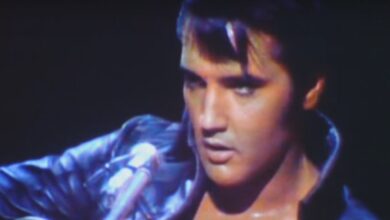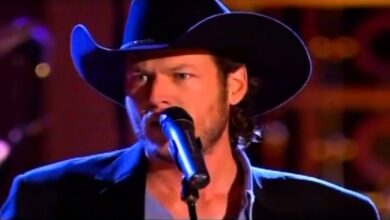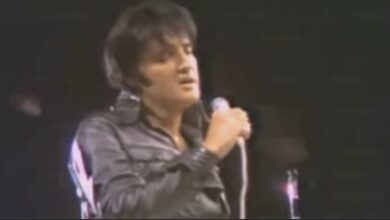Prime Elvis: A striking presence, desired by women, envied by men, no longer just a young star
Elvis Presley’s ’68 Comeback Special, also known simply as “Elvis,” holds a revered place in the annals of rock and roll history, marking a pivotal moment in the career of the legendary singer. Broadcast on December 3, 1968, the special served as a dramatic resurgence for Presley, who had spent much of the 1960s focused on Hollywood films rather than his music career. Directed by Steve Binder, the special was a deliberate effort to reposition Elvis as a live performer of contemporary relevance, showcasing his versatility and dynamism.
One of the standout moments from the special was Elvis’s impromptu performance of Jimmy Reed’s blues classic, “Baby, What You Want Me To Do.” This unplanned jam session encapsulated the raw energy and spontaneity that defined Elvis’s early career, harkening back to his roots in rockabilly and blues. Accompanied by a band of skilled musicians, including guitarist Scotty Moore and drummer D.J. Fontana, Elvis launched into the song with confident guitar strumming and his unmistakable baritone voice, immediately captivating the audience.
What distinguished this performance was its unscripted nature. Unlike the meticulously choreographed routines typical of television appearances at the time, Elvis and his band approached “Baby, What You Want Me To Do” with an improvised spirit, feeding off each other’s energy and creating a vibrant, live atmosphere. The band’s chemistry was palpable as they seamlessly transitioned between verses and instrumental breaks, showcasing their musical prowess and collective spontaneity.
The audience response was enthusiastic and immediate, with viewers and attendees alike drawn into the infectious energy of the performance. The interaction between Elvis, his band, and the live audience added to the electric atmosphere, heightening the impact of the moment. This spontaneous jam session not only reaffirmed Elvis’s status as a charismatic performer but also demonstrated his ability to connect deeply with his audience through music.
Beyond its musical significance, the ’68 Comeback Special was a strategic career move for Elvis. It marked his return to live performance after years of primarily focusing on film projects, reaffirming his relevance in an evolving music industry landscape dominated by rock and roll and emerging genres like psychedelic rock and soul. The special’s format, which interspersed intimate acoustic sets with full-band performances, showcased Elvis’s versatility and adaptability across various musical styles, from rockabilly to gospel to blues.
Born on January 8, 1935, in Tupelo, Mississippi, Elvis Aaron Presley rose to fame in the mid-1950s with a string of groundbreaking hits that reshaped popular music. His fusion of country, blues, and rhythm and blues elements into a distinctive rock and roll sound captured the imagination of a generation and propelled him to international stardom. Songs like “Heartbreak Hotel,” “Hound Dog,” and “Jailhouse Rock” became anthems of youth rebellion and musical innovation, solidifying Elvis’s place as a cultural icon.
The ’68 Comeback Special not only reignited public interest in Elvis’s music but also set the stage for a career resurgence that would continue into the early 1970s. Following the special’s broadcast, Elvis embarked on successful concert tours and returned to the recording studio with renewed vigor, producing hits such as “Suspicious Minds” and “In the Ghetto.” His ability to evolve with the times while staying true to his roots endeared him to audiences across generations and solidified his legacy as the King of Rock and Roll.
In retrospect, the impromptu performance of “Baby, What You Want Me To Do” during the ’68 Comeback Special remains a defining moment in Elvis Presley’s career. It encapsulates his musical prowess, stage charisma, and enduring influence on rock and roll. The special itself stands as a testament to Elvis’s ability to captivate audiences with his raw talent and passion for music, transcending generations and leaving an indelible mark on popular culture.
Elvis Presley’s impact extends far beyond his music; his cultural significance as an icon of rock and roll continues to resonate worldwide. His contributions to music and entertainment have been celebrated with numerous accolades, including inductions into multiple halls of fame and recognition for his lasting influence on the industry. From humble beginnings in Tupelo to global superstardom, Elvis Presley’s legacy endures as a beacon of artistic innovation and cultural resonance, forever etched in the fabric of rock and roll history.
YouTube URL(s):



